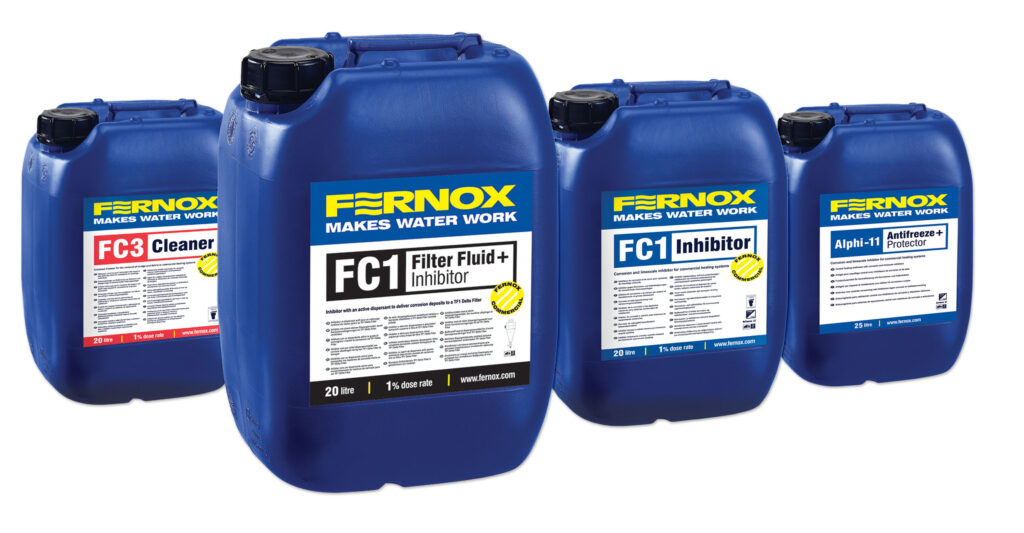The Carbon Trust has recently launched its new Green Business Fund to help, advise and fund UK SMEs to replace older, energy intensive equipment. This includes all aspects of a business’ energy consumption from lighting and air conditioning to HVAC heating systems; replacing old, inefficient boilers, controls and equipment with new more energy efficient alternatives. Here, Francine Wickham, Global Marketing Director at Fernox explains that although initiatives like this can have a positive impact on reducing the overall carbon footprint of a building; to ensure maximum system protection and energy efficiency, it is important that water treatment is not forgotten when replacing or updating heating systems.
The introduction of the Green Business Fund is set to provide support for up to 2,000 smaller businesses to update old equipment that has a high environmental impact. The £7 million fund is available to SMEs on a first come, first served basis – offering guidance and training, as well as financial support for the installation of energy efficient equipment. Today, there is a greater expectation being placed on building services engineers to ensure continuous energy efficiency of premises. While new initiatives such as the Green Business Fund promote upgrading entire systems, it is vital to understand that there are simple ways to help make sure that the new system continues to work as intended long-term; and additionally, there are also options available to avoid the need for installing a completely new system. A combination of effective chemical water treatment and filter technology is a proven and simple method of restoring optimum performance and energy efficiency of commercial heating systems.
Commercial systems are vulnerable to the damaging effects of sludge and corrosion, which occur when water comes into contact with metal in mixed metal heating systems. When left to accumulate, sludge and corrosion can block and quickly damage vital system components. A sludged, dirty installation has to work much harder to heat up a building, resulting in excessive fuel usage and increased carbon emissions. This means effective water treatment is crucial. Best practice is to ensure that the system is flushed using a high quality chemical cleaner such as FC3 Cleaner, which helps remove any sludge and debris quickly and effectively. Once the system water is clean, it should be dosed using a quality inhibitor, such as the best-in-class Fernox FC1 Inhibitor. This product should be left permanently in the system and dilution levels checked at the annual service to ensure the inhibitor continues to protect the system against corrosion formation and limescale build-up, helping to maintain and optimise system efficiency.
For a thorough approach to system protection and energy efficiency – all systems should be fitted with a reliable filter. This will help to maintain performance, and ensure that any residual or circulating system contaminants are captured, contained and removed. The long-term result will be reduced environmental impact, greater fuel efficiency, and of course, reduced energy costs. The use of an effective system filter can be an extremely valuable part of a holistic approach to system protection. Developments in water treatment have led the introduction of commercial and light commercial filters to the market, including the Fernox TF1 Delta Filter, which combines three methods of filtration – magnetic, hydrocyclonic and automatic or manual deaeration – for the effective removal of harmful debris and contaminants. The Fernox TF1 Delta Filter has been specifically designed to protect the vital and expensive components in large volume, light commercial heating systems. It is also important to consider maximising the effectiveness of a system filter, by dosing the system with an innovative chemical water treatment such as FC1 Filter Fluid+ Inhibitor. This unique product combines the proven effectiveness of the FC1 Inhibitor to protect against corrosion and scale formation; with an active dispersant package designed to detect, lift and deliver contaminants to a system filter for a safe removal.
When used together, Fernox FC1 Filter Fluid + Inhibitor and the TF1 Delta Filter continuously protect the system against circulating debris that causes component damage or system breakdown. For buildings such as hospitals, schools or factories where unplanned downtime to clean and treat a system is not a practical or viable option, the combination of a system filter and Fernox FC1 Filter Fluid+ Inhibitor is an ideal one to ensure the heating system keeps working without disruption until scheduled maintenance work to clean and treat the system can be undertaken.
Building services engineers are often tasked with delivering maximum system efficiency for large and complex buildings. Schemes such as the Green Business Fund will undoubtedly help – offering the means for commercial businesses to reduce their environmental impact. However, it is absolutely crucial that chemical water treatment and filter technology are utilised in all commercial applications. Only then can existing systems be restored to optimum efficiency levels and new installations continue to work as they have been designed to do. The good news is that with today’s wide range of high performance chemicals and advanced filtration devices – best practice, system protection and energy efficiency are becoming easier to achieve and maintain long-term.



















